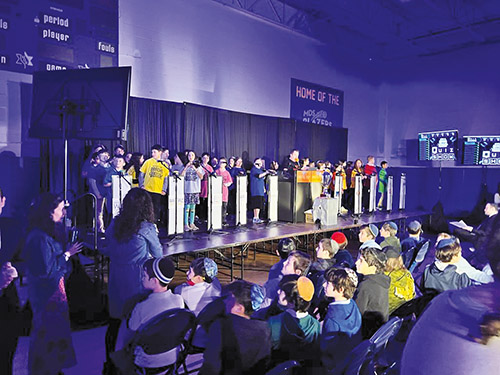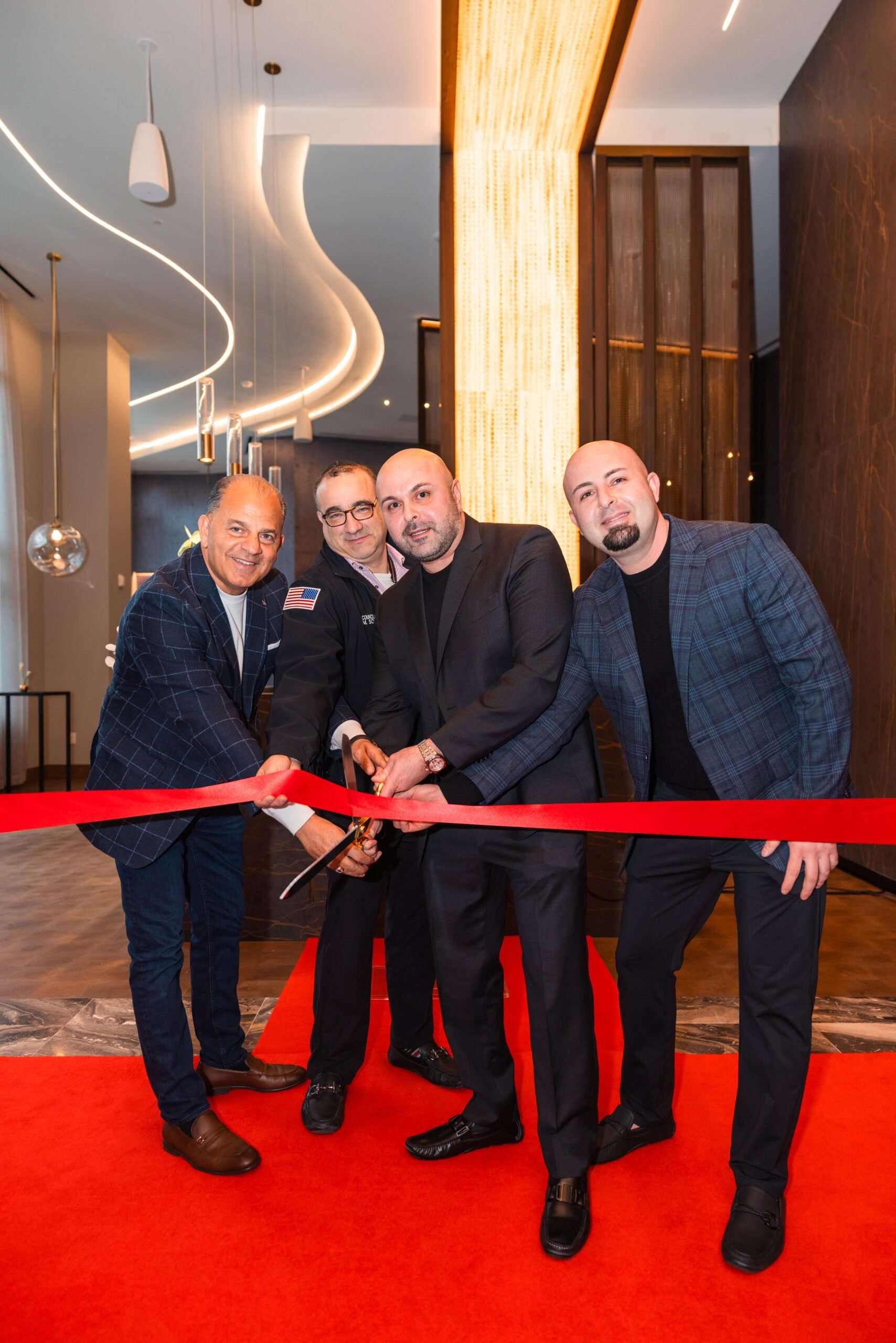
The excitement in the air of the Manhattan Day School (MDS) gymnasium was palpable, as a full house of students anxiously awaited the beginning of the first-ever Tu B’Shevat Bracha Bowl. The event was conceptualized by Rabbi Dr. Steven Eisenberg, lower school principal at MDS, which finally came to fruition on Monday, February 6. A total of 10 schools from across New York and New Jersey participated in the competition, each displaying their hard work and dedication to learning the brachot in a series of hard-hitting questions as well as speed trivia. At the end of the spectacular event, SAR Academy claimed first place, taking home the big silver championship trophy—but it was clear that everyone had an unforgettable time.
The participants at the Bracha Bowl were all top-scoring students at their respective school’s bracha bees, ranging from third to fifth grade. Teams hailed from Westchester Torah Academy (WTA), Ramaz, Westchester Day School, SAR Academy and MDS—all in the “eastern conference”—as well as Moriah, Yeshivat Noam, Yeshivat He’Atid, Yavneh Academy and RYNJ in the “western conference.”
“I thought that if we take our own bracha bee very seriously, other schools must also and I wanted that to carry over,” Rabbi Eisenberg explained about the inception of the Bracha Bowl. “We have major competitions like the spelling bee and the Torah bowl, but I felt that third, fourth and fifth graders never really get the chance to showcase their skills. This was an opportunity to let those younger students shine.”
When Rabbi Eisenberg developed the idea of the Bracha Bowl over the summer, he began reaching out to other schools in the area to gauge interest in the event. “After discussing it, we got down to the core of why we’re doing this: to reinforce the idea that brachot are a big deal.” Along with MDS Director of Student Activities Melissa Appel, Rabbi Eisenberg received interest from nine other schools and set the date for Tu B’Shevat; which he explained in his opening speech is about rejuvenation and renewal, similar to brachot.
“When we make a bracha, we use the present tense ‘boreh,’ instead of the past tense, ‘barah,” Rabbi Eisenberg shared with the room full of students. “God actively creates, and even though we don’t always see it, He is constantly there keeping us going. That is what Tu B’Shevat is about.”

And so, the months of preparation began. “We really wanted to go big with this event,” Appel shared with The Jewish Link. And big they went, with a spotlit auditorium reminiscent of a game show and a platform stage for the contestants. MDS tapped Digital Dov, the spirited entertainer and emcee Dov Katz, to run the show and make it an exciting and interactive experience for the Bracha Bowl participants.
As the students arrived at the MDS campus on the Upper West Side, they received color-coded T-shirts, making it easy for the hundreds of viewers on Zoom to differentiate among the teams. After both Rabbi Eisenberg and Digital Dov made introductions, the teams lined up behind their respective podiums, affixed with buzzers for answering bracha-related questions. The in-person attendees, mainly the third, fourth and fifth graders of MDS, clapped and cheered for teams as they answered question after question, each one harder than the next.
 After the first round, Digital Dov called one team up at a time to participate in speed trivia, an adrenaline-pumping lightning round of multiple choice questions. The teams each had a chance to add points to their total score before beginning the second round, which consisted of even more challenging bracha-related topics, including some real stumpers. The final round was a “final jeopardy,” where the teams each wagered a certain amount of points before hearing a tough question and conferring to come up with the correct answer. After a very tight competition, SAR Academy pulled ahead with 5,800 total points, with MDS and RYNJ at a close second and third place. In the end, everyone who competed earned a championship medal for accomplishing a major feat in the first-ever Bracha Bowl!
After the first round, Digital Dov called one team up at a time to participate in speed trivia, an adrenaline-pumping lightning round of multiple choice questions. The teams each had a chance to add points to their total score before beginning the second round, which consisted of even more challenging bracha-related topics, including some real stumpers. The final round was a “final jeopardy,” where the teams each wagered a certain amount of points before hearing a tough question and conferring to come up with the correct answer. After a very tight competition, SAR Academy pulled ahead with 5,800 total points, with MDS and RYNJ at a close second and third place. In the end, everyone who competed earned a championship medal for accomplishing a major feat in the first-ever Bracha Bowl!
But how did the amazing competitors do it? “The trick is to study a lot,” said MDS fourth grader Sam Gibber. “I studied for two hours a night at least. You shouldn’t overwork yourself, and you should try to divide it up by difficulty and mix together harder brachot with easier ones.”
“You should definitely have your parents test you,” added MDS fourth grader Jacob Stember. “Even if you don’t win, just remember that you’re still champions and you made it to the final round.”
Sharon Sturm, the fifth grade Judaic studies teacher who coached SAR to victory, agreed that the pride was in the process. “We are so proud of our students, not just for winning, but for what they’ve done in school to get to this point,” she shared with The Jewish Link. “It’s a moving experience for me as a teacher to see the passion and enthusiasm for mitzvot.”
 Sturm recounted how the SAR students became more and more spirited as the Bracha Bowl approached, incorporating brachot into every aspect of their lives, both at home and at school.
Sturm recounted how the SAR students became more and more spirited as the Bracha Bowl approached, incorporating brachot into every aspect of their lives, both at home and at school.
“The teachers also made it a priority to focus on brachot, and it became a whole new dynamic part of the curriculum,” she said. She continued that students were studying brachot during every possible break, pairing with both siblings and classmates to learn as much as they could.
“My sister made me flashcards to study,” said SAR third grader Ezra Gerber. “I studied with her every night, and it makes me feel so happy that we get to bring home the trophy to SAR.”
“Today’s win shows how a lot of effort can pay off,” SAR fifth grader Aleeza Wurzberger shared.
Echoed fourth grader Eitan Schlenger, “We worked really hard and this win feels really good!”
“I think this went really well,” said MDS’ Appel. “It was amazing to see all of the kids get together and have a great time with each other. It was really unbelievable.”
Rabbi Eisenberg added, “It was amazing to see all of the excitement and cheering for brachot and the enthusiasm that everyone had throughout the competition.”
“It really was an incredible event, and something that brings the community closer together,” Digital Dov reflected afterward.
“It’s such a great opportunity to be the first school to host the Bracha Bowl,” Rabbi Eisenberg noted. “The MDS students really tried their best, and even though they didn’t win, I think they loved just being there to have their friends cheer them on. It was so special, and the spirit was palpable. I am so proud of them. It was a real kiddush Hashem to see kids getting so excited about brachot and about recognizing that Hashem is always there for us.”
So what’s next for the Bracha Bowl? “We hope another school will host it next year,” said Appel, which Rabbi Eisenberg echoed in his idea that the winning team should get the first chance to host the following year. “We also hope it grows to include more schools.”
“I see this as the first of many opportunities for schools to get together beyond competitions—like rallying for government funding or social issues we face,” Rabbi Eisenberg shared. “We are stronger together, and hopefully this is just the beginning.”
By Channa Fischer











